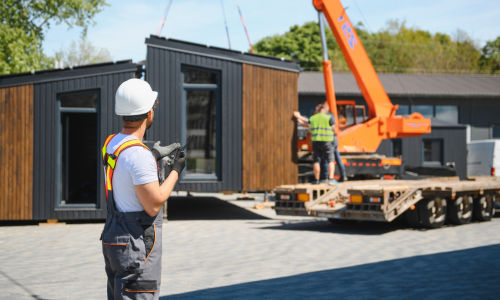How MMC can support healthcare and education providers
The demand for flexible, high-quality spaces in the UK's healthcare and education sectors has never been greater. With rising patient numbers and growing student populations, traditional construction methods often fall short in delivering timely, cost-effective solutions. Modular buildings present an alternative, offering speed, adaptability, and sustainability while easing financial pressures.
The growing need for space
Statistics from the British Medical Association state the NHS faces massive waiting lists, with around 7.3 million patients in England awaiting treatment as of May 2025. Hospitals require additional clinical space, consultation rooms, and diagnostic centres to manage demand.
The Department for Education estimates a need for an extra 420,000 school places in England in 2025 due to rising pupil numbers.
Traditional builds can take years, but modern methods of construction (MMC) delivers permanent or temporary facilities in weeks or months, ensuring vital services continue without disruption.
Key benefits of modular buildings
Reduced timelines
Modular buildings are manufactured off-site while groundworks are completed, reducing timelines massively. For example, NHS Nightingale hospitals were rapidly deployed during the pandemic, proving the effectiveness of modular solutions in emergencies. Schools can also benefit, with entire classroom blocks installed within a single term.
Adaptability
Both healthcare and education needs evolve. Modular buildings can be reconfigured, expanded, or relocated as requirements change. A school may need extra classrooms one year and a science lab the next, while hospitals might require pop-up vaccination centres or additional ward space.
Meeting net zero targets
With the NHS aiming for net zero by 2040 and schools under pressure to reduce carbon footprints, modular construction supports sustainability goals. Off-site manufacturing reduces waste, while energy-efficient designs lower long-term operational costs.
Guaranteeing compliance through expertise
Procuring compliant modular buildings can be complex, but frameworks like LHC’s Modular Buildings (MB3) simplify the process. The framework provides access to vetted suppliers, ensuring projects meet all regulatory requirements such as fire safety. LHC’s Added Value Services programme further supports clients with expert guidance, helping NHS trusts and schools make informed decisions for a smooth, compliant procurement process.
A strategic solution for healthcare and education
Modular construction is a strategic solution for healthcare and education providers. By delivering high-quality, adaptable spaces at speed, it helps manage growing demand and also offers financial and operational flexibility. With trusted frameworks like LHC’s Modular Buildings (MB3), procurement teams can install modular buildings with confidence, knowing compliance and quality are assured.
For more information on LHC’s Modular Buildings (MB3) framework contact LHC’s Regional Manager Boby.Singh@lhcprocure.org.
To meet MMC experts in person, join LHC’s Modular Buildings: A turnkey solution from design to handover event on September the 25th at The Cumberland Hotel, Marble Arch.


